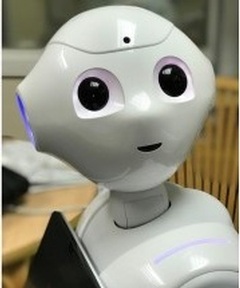Elderly should be looked after by 'care-bots' to save time and money
The elderly should be looked after by ‘care-bots’ and hospital patients should be given ‘bedside robots’ to feed them and rehabilitate them, according to a think tank.

The recommendations by the IPPR think tank will be part of a landmark report into the future of the NHS and social care, led by surgeon and former health minister Lord Darzi.
The think tank believes an increased use of automation and artificial-intelligence based systems would free up frontline time worth up to £12.5bn a year, almost 10 per cent of its annual running cost and would also result in a further £6bn productivity gain within social care, where 30 per cent of current tasks could be done by new technology.
Echoing a remark by Aneurin Bevan, health minister when the NHS was launched in 1948, Lord Darzi’s report said: “In the 21st century NHS, it might not be the sound of a bedpan dropping that is heard in Whitehall, but that of a robot picking it up. The NHS turns 70 this year but we must turn our sights to the future. We should not accept an analogue NHS in a digital decade.”
The report claims 'care-bots’ will empower people in old age, enabling better, longer, and more fulfilling lives, and improve social care. Digital systems and ‘care-bots’ will enable people to remain more socially connected to friends and family.’
It highlights the use of robotic pets which can provide some of the comfort of companion animals without the need to be cared for in return.
‘Bedside robots’ in hospitals and care homes may also become a reality, assisting patients with meals, transportation and portering, and rehabilitation, said IPPR.
'Care-bots are emotionally dangerous'
However Maggie Boden, professor of Cognitive Science at the University of Sussex has warned in the past that ‘care-bots’ are “emotionally dangerous” and will never be good enough to take the place of real human contact.
Last year, Southend-on-Sea Borough Council became the first local authority in the country to buy and use an artificial humanoid under an academic licence.
Named Pepper, it has the ability to communicate, perceive principal human emotions, adapt its own behaviour and make independent decisions. This gives it the ability to play videos, music and sensory games that can help people with dementia and children with complex disabilities, according to the council.
'We strongly believe Pepper can have a positive impact on social care'
Lesley Salter, Southend’s executive councillor for health and adult social care, said: “Robots may seem like something from the distant future, but the technology is here and we strongly believe that Pepper can have a positive impact on social care as we continue to transform our services and make sure they are fit for the future.”
She said they are hoping to use Pepper to run a reminiscence group for people with dementia, and that academics are exploring how robotics can help stroke survivors to do physio exercises.
She added: “We are absolutely clear that Pepper is not here to replace any of our people, but to complement and help the existing staff we have to deliver a better service by freeing up time for them to deal directly with people for example.”
IPPR also insists that more automation will not lead to job losses as in ‘health and social care it will complement human skills and talents, by reducing the burden of repetitive and administrative tasks and freeing up of staff to spend more time on direct clinical care with patients’.
IPPR says communicating medical notes, booking appointments and processing prescriptions are examples of the many activities that should be carried out through digital technology.
A patient arriving at hospital may undergo digital triage in an automated assessment suite. Artificial intelligence-based systems, including machine-learning algorithms, would be used to make more accurate diagnoses of diseases such as pneumonia, breast and skin cancers, eye diseases and heart conditions.
Robots can already tie knots and stitch with greater accuracy than humans
Lord Darzi, himself a pioneer in robotics-assisted minimally invasive surgery, points out these systems are already able to carry out some surgical tasks such as tying knots and making stitches with greater accuracy and dexterity than humans.
He wants the Government to embrace a strategy aimed at delivering ‘full automation’ for ‘repetitive and administrative tasks in health and care’. He proposes offering all staff affected by automation ‘the right to retrain’.
Lord Darzi and his colleague, Lord Prior, a former Conservative health minister, have called for an injection of cash rising to more than £50bn a year for the NHS by 2030, and £10bn a year for social care.
Their report on the reform and future of the NHS will be published later this month.
Latest News
 29-Jul-24
Dementia Bus gives carehome.co.uk staff insight into life with dementia
29-Jul-24
Dementia Bus gives carehome.co.uk staff insight into life with dementia
 01-Mar-24
Find out the top care homes in 2024
01-Mar-24
Find out the top care homes in 2024
 21-Mar-23
UK's top care homes in 2023 revealed
21-Mar-23
UK's top care homes in 2023 revealed
 03-Jan-23
carehome.co.uk launches free care helpline
03-Jan-23
carehome.co.uk launches free care helpline
 13-Dec-22
5 mins with Emily Whitehurst, chief operating officer for Constantia Healthcare
13-Dec-22
5 mins with Emily Whitehurst, chief operating officer for Constantia Healthcare